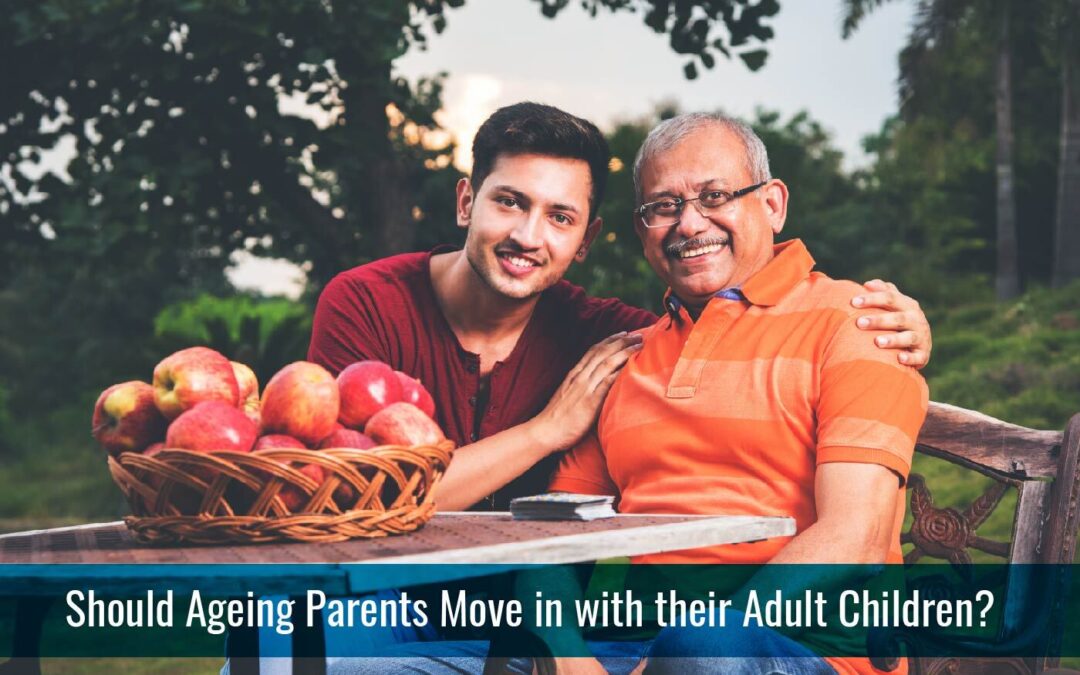Should Ageing Parents Move in with their Adult Children?
Many Elders over the age of 65 need physical, mental or financial assistance to lead a dignified life. There comes the point in every child’s life when they need to care for their ageing parents. The idea that pops right away in the adult caregiving child’s mind is to move their parents into their house.
While moving parents into the house might feel like the safest option for the children, looking at the bigger picture is necessary. It all depends on the kind of care and facilities the Elders need. It’s also essential to understand the space and flexibility they may need.
If you decide to move your ageing parents in for caregiving, you need to look at a list of pros and cons. Some alternatives can suit your parents better than moving in with you.
Benefits of moving your ageing parents under one roof:
Care of a Loved One
Elders with health issues may experience a lot of anxiety. Moving in with the family will help ease the anxiety and make them feel better, especially if they are dealing with some health issues such as dementia or Alzheimer’s disease.
Save on Expenses
You and your parents both can save on some of the expenses by living under the same roof. The expenses towards the rent and bills can now be utilised for care and facilities they need to stay comfortably at your home. You might need to make certain modifications in your home to make it a safe space for them, like safety handles in the bathroom, brighter hallways and more.
What’s better than being surrounded by family?
Shifting into your home might provide some comfort to your ageing parents. Having family around them will make them happy and keep them engaged, decreasing the chances of depression and isolation. Giving them a particular room at your home will make them feel like they have some degree of independence and privacy.
A Helping Hand
Ageing Parents might have a strict routine and want to do everything on their own. Living under the same roof, you can keep them under supervision while going on with their day. You can also lend a helping hand wherever necessary, and it is probably the best way to keep them safe and healthy.
Spend quality time with Parents
In the process of trying to earn a living, you may have lost out on spending time with your parents. Moving your parents into your home allows you to spend time with them, make new memories, and cherish the old ones. This is the best way to provide a secure and happy life to your parents.
Drawbacks of moving your ageing parents into your home:
Independence and Privacy
Privacy issues will not just affect you but also your parents who have shifted into your home. Everybody would need to make adjustments, and it will affect all of your lives significantly. You may need to consider their needs every time you go out. It will be challenging if your work requires you to work late hours or travel.
Increased Health Risks
Moving in with you might increase their chances of infections and falling sick. Especially in the age of the covid stricken world, the elderly are more prone to illnesses not limited to Covid-19. Even the cold and cough will be needed to be taken seriously so that you and they stay healthy.
Increased Responsibilities
You might need to take responsibility for your parent’s health care plans and financial decisions if they have assigned you as a power of attorney. Then it’s essential to be prepared for stressful situations and be ready for a shift.
Expensive Home Modifications
When the Elderly move into your home, it’s your job to make the home safe for them. According to your parent’s needs, home modifications will be necessary – wheelchair ramps, safety bars in the bathroom, and widened and well-lit hallways. A room downstairs ensures they don’t need to take the stairs every time to reach their room. All these modifications might cost you a sizable sum. Understand the finances involved and make the right decision.
Added Stress
Looking after the Elderly can get stressful sometimes, especially when you are balancing work and your family at once. With all this in mind, you need to ensure that you take care of yourself, the most important thing.
Parents Cognitive Decline
As we age, our ability to perform routine tasks also decreases, making it challenging for your parents and you to live together. You may even lose patience at times, which will worsen if your parent has dementia or Alzheimer’s. These types of situations are professionally handled by caregivers and senior home care providers (hyperlink kites).
Here are some alternative caregiving methods for your ageing parents:
Senior Home Care
Trusting a caregiving facility and letting them take care of your parents at their home is a tough decision to make. Still, it might prove helpful if your parents think they are very comfortable in their own home.
At Home, Senior Care facilities provide many facilities which help you stay up to date about your ageing parents’ health and be stress-free.
Here are some facilities offered by Geriatric Home Care providers like KITES:
Geriatric Family Counselling
Caregivers/Healthcare Technicians
Home Nursing
ICU & Critical Care Services
Physician visit & online consultation
Nursing Services
Geriatric Physiotherapy
Speech & Respiratory Therapies
Second Opinion
Lab Tests, Medicines & Medical Devices
All these facilities are available even at the senior care premises, a safe space for your elderly.
Conclusion
Now that you have learned about all the pros and cons, you can make a well-informed decision about your parents’ good health and safety. If you are looking for senior health care facilities for your loved one, then KITES is the place to trust. Contact Us!

